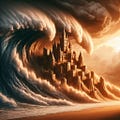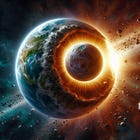Risk & Progress| A hub for essays that explore risk, human progress, and your potential. My mission is to educate, inspire, and invest in concepts that promote a better future. Subscriptions are free, paid subscribers gain access to the full archive, including the Pathways of Progress and Realize essay series.
Physics is the law, everything else, is merely a recommendation. Everything that is, ever was, and will be, is bound by the laws of physics. As a fundamental starting point, we begin our discussion with “entropy,” a concept that dictates the basic function and operation of everything in our universe. In my view, entropy gives us meaning, purpose, and is what makes human progress important.
What is Entropy?
The concept we call entropy is a natural consequence of the Second Law of Thermodynamics. For the unfamiliar, the First Law of Thermodynamics states that energy cannot be created nor destroyed. The Second Law states that in an isolated system “entropy” will never decrease. These are universal truths, physical laws that cannot be broken. Until we can escape our universe, we are forever bound to adhere to them.
So, what does this mean for us? Though the concept describes the dispersion of heat in a system, entropy can be thought of as a measure of “disorder,” the higher the entropy, the more disorder. In our universe, it is a law that everything always trends from order to disorder. This concept is a fundamental force acting on everything we are, everything we do, and everything that happens to us.
The easiest way to think about entropy is to imagine you are given a brand-new puzzle in a box. Ask yourself, should you dump the puzzle pieces onto a table, will they land perfectly ordered into their final picture? No, they will not, at least almost certainly not. Instead, the pieces will land in a completely random fashion, completely disordered. Why? While it is technically possible to dump the pieces out and for them to bounce and arrange themselves into the final picture, the probability of this happening is inestimably small. There is only one way for the pieces to arrange themselves into the final picture, but nearly infinite ways, on the other hand, for the pieces to land in the “wrong” or disordered fashion.
Another way to think about entropy is to imagine building a sandcastle on the beach and returning a few days later. In all likelihood, your sandcastle is long gone, the grains of sand returned to a random arrangement of particles on the beach. Here again, there is only one arrangement of sand grains that builds the castle, but nearly infinite arrangements otherwise. The universe, absent intervention, will always return the order to disorder.
Purpose and Meaning
While this may sound like bad news, it isn’t. While a random collection of atoms will succumb to entropy, a specific arrangement of atoms and molecules can resist: life. By definition, life brings order to the chaos. Cells take in nutrients, they build complex organelles, and they divide and reproduce. Trees absorb sunlight, growing taller and wider, creating structures of order from the energy and atoms around them.
To be clear, this does not mean that life violates the laws of physics. As we will see, quite the opposite. Life is capable of carving a slice of order from disorder. Organisms can counter entropy because they are not isolated systems as required by the second law. Indeed, the desire to resist entropy may be so deeply rooted in biology that we are naturally wired to be attracted to counter-entropic forms, from flowers to architecture. Beauty may not be in the eye of the beholder, but more objective than we realize or are willing to admit.
Humans are unique compared with other life forms. Our large brains and ability to communicate through vocal vibrations enable us to plan, wonder, reason, and spread knowledge. As far as we know, we are the only arrangement of atoms capable of discovering and understanding the very laws of the universe that constrain us. Because of entropy, without our constant attention and care, our homes fall into disrepair, our cities decay, our cars break down, and our bodies grow frail. And while we cannot counter entropy forever as individuals, as a collective species, we can do so for a nearly infinite time.
It is this struggle against entropy that gives us purpose, meaning, and what fundamentally defines progress. Progress is our struggle against entropy. It’s our endeavor to create order from the disorder. This requires, above all else, knowledge. As we will see, what we call “technology” is the use of knowledge to create beneficial counter-entropic forms; utilizing atoms and energy for human ends. Ultimately, we strive to sustain the light of human consciousness as long as possible.
One day, an exhausted Sun will expand and boil off Earth’s oceans, if not consume the Earth entirely. When this happens, all life on the pale blue dot will end, and its counter-entropic beauty will cease to exist. The only hope for life is us. Progress has bequeathed our species with nearly limitless technological capability. With this power, the power of knowledge, we have the potential to leave this planet, taking life with us to other star systems. We often ask, why are we here? What is our purpose? My answer is, as good stewards of Earth, we are here to spare life total annihilation from that fusion engine 93 million miles away.
You also may like…






Very nice vantage point to Entropy.
I was fascinated by this phanomenon for a long and was thinking about it.
I realized, that this effect of entropy is seen in the entire world, even in economics.
When you focus on the word product, it appears, that it says pro-duct. Which means basically something like an artwork. A pro-duct has a life-cycle, it gets born, growth and later it decays. At that late stage, the decays, the entropy demolishes the order and forces mankind to reinvent.
Actually, inflation is nothing else then entropy in economics.
I have written that down in a specatculary science-fiction novel, called "the Entropieneur", that descripes the mechanism more specifically.
Regards from Germany
Carsten Detzer
Thank you JK! You motivated me to refresh my memory on the different definitions of entropy.